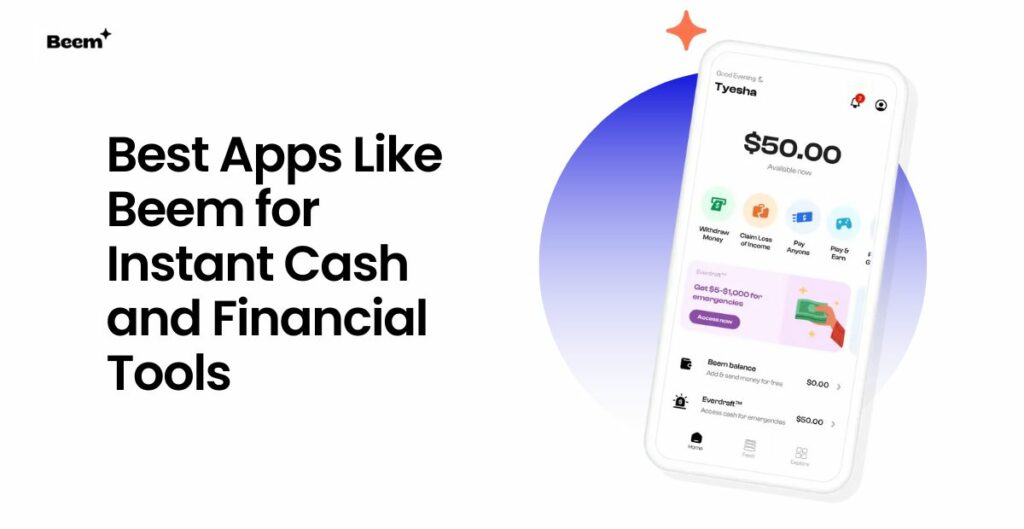Cash apps like Venmo offer numerous benefits in today’s digital age. They provide a convenient and quick way to transfer money, split bills, and make payments seamlessly. Venmo, in particular, stands out with its social integration, allowing users to share payment activities with friends. It promotes financial transparency and simplifies group expenses.
However, exploring alternatives is crucial for several reasons. Security concerns and data privacy should be prioritized, ensuring that personal information remains confidential. Transaction fees and limits can also vary between platforms, impacting overall cost-effectiveness.
Check out Venmo alternatives and diversify options to help users adapt to changing features, policies, or potential service disruptions. Exploring alternatives ensures informed choices aligned with individual preferences and requirements. Here is the summary of each app
| App | Pros | Cons |
|---|---|---|
| Beem | Instant cash advance, credit score monitoring, diverse transfer options | No cons. Simply complete your KYC, check qualification, subscribe & withdraw cash in minutes. |
| PayPal | Versatile payment solution, accepts major cards, integrates with shopping carts | High fees, poor customer service reputation |
| Google Pay | Broad device compatibility, secure online payments, strong recordkeeping | Limited bank participation, slow transfers |
| Payoneer | Global accessibility, low fees, scalable for businesses | Collects personal information, limitations for point-of-sale transactions |
| Stripe | Versatile for businesses, supports multiple currencies, easy setup | Complex for non-developers, limited in-person sales functionality |
| Square | Easy setup, unlimited product listings, integrated dashboards | High fees, restrictive processing rules |
| Cash App | Free money transfers, debit card option, stock and Bitcoin investing | No FDIC insurance for Cash Card balance, transaction fees |
| Zelle | Quick and secure transfers within the US, free for most transactions | Limited to US bank transfers, no debit/credit card payments |
| Apple Cash | Seamless integration with Apple services, cashback rewards | Limited to Apple users, potential incompatibility with older iPhones |
| Wise | Cost-effective international transfers, transparent fees | Limited regions and currencies supported |
| Meta Pay | Integrates with Facebook/Messenger, streamlined social media purchases | Requires debit card and Facebook account, limited to domestic transfers |
| Skrill | Zero deposit fees, convenient withdrawal options | Merchant fees, inactive account fees |
| Dayforce HCM | Comprehensive HCM solution, streamlines workforce operations | Complex reporting, limitations in some functionalities |
| Remitly | User-friendly interface, affordable economy transfers, high user ratings | Extra charges for credit card payments, high express transfer fees |
| WePay | Robust payment API for platforms, social risk management engine | Complex integration for non-technical users, transaction fees |
| WorldRemit | Transparent fees, extensive reach with over 70 currencies | Low maximum send limits, limited wallet storage currencies |
| Amazon Pay | Streamlined checkout, leverages Amazon’s user network and security | Limited transaction amount, requires Amazon account |
| Braintree | Enhances sales and operations for businesses, integrates with multiple wallets | Transaction fees, chargeback fees |
Apps like Venmo – 15 Best Alternatives
1. Beem

Beem is a compelling alternative to Venmo, offering unique features and financial solutions. With Everdraft™, Beem provides users with an instant cash advance of up to $1,000 for emergencies, eliminating interest, income restrictions, and credit checks.
The Better Financial Feed™ enhances financial management, delivering timely alerts and personalized insights. Beem stands out by allowing users to send money instantly to anyone without a bank account or the Beem app. Earn up to 20% cash back, monitor and improve your credit score, and benefit from robust security measures.
Sending limits
Beem offers diverse ways to access instant cash, including sending money to anyone and purchasing gift cards, prepaid cards, and more.
The platform also provides flexibility with different transfer options, catering to user preferences and needs.
Data security
PCI-DSS certification ensures that Beem employs gold-standard security systems, preventing data leaks and maintaining robust cybersecurity.
End-to-end encryption is applied to data transmission and storage, offering users a secure environment for financial transactions and personal information.
2. PayPal

PayPal is a viable alternative to Venmo with a versatile payment solution. Offering a contract-free approach for merchants and consumers, it provides secure and private transactions for purchases, money transfers, and invoice payments. While businesses benefit from various services and financing options, consumers can enjoy the ease of payment through multiple channels.
However, PayPal has drawbacks, including a poor customer service reputation and higher fees than other platforms. Notably, its spending limits vary based on verification status. Despite its cons, PayPal remains a widely used and integrated platform in the digital payment landscape.
Pros
- Accepts all major card brands.
- Seamless integration as a payment gateway with eCommerce shopping carts.
- Allows payments from customers without a PayPal account.
- Facilitates transactions in 25 different currencies.
Cons
- Poor customer service reputation.
- Higher fees compared to many other platforms.
- Imposes hefty chargeback fees.
- Funds may take up to three days to clear, and there are instances of freezing funds without notice.
Sending limits
- Without verification, PayPal limits transfer to $4,000.
- Once verified, users can send up to $60,000 per transaction, with potential individual limits based on currency, reaching up to $10,000.
- No limit on the total amount transferable in a day.
Data security
- PayPal prioritizes security, employing measures to safeguard transactions and user data.
- The platform uses encryption to ensure the confidentiality of sensitive information, contributing to a secure online payment environment.
3. Google Pay

Google Pay emerges as a robust Venmo alternative with broad compatibility across various devices. Its layers of security, including encryption during online payments, ensure the safety of transactions. However, the platform needs to be improved, particularly in the availability of services in certain countries and the constraint of NFC technology.
While offering additional uses beyond peer-to-peer transactions, Google Pay contends with a restricted list of participating banks and the drawback of slow bank account transfers. Users benefit from strong recordkeeping capabilities. Notably, Google Pay imposes daily and transaction-specific sending limits to manage financial activities securely.
Pros
- Broad compatibility across various devices.
- Robust layers of security, including data encryption during online payments.
- Additional uses beyond peer-to-peer transactions.
- Strong recordkeeping capabilities.
Cons
- Limitations in availability, particularly in certain countries.
- Constraints of NFC technology for specific transactions.
- A limited list of participating banks.
- Slow bank account transfers.
Sending limits
- Maximum single transaction amount: $2,000.
- Daily maximum total transaction amount: $2,500.
- Up to 15 transactions per day.
- Additional limits may be imposed according to Google Pay’s Terms of Service.
Data security
- Google Pay prioritizes data security, encrypting information during online transactions.
- The platform employs measures to safeguard user data, contributing to a secure and protected payment environment.
4. Payoneer

Payoneer stands out as a global alternative to Venmo, offering businesses and freelancers a versatile payment solution accessible in over 200 countries. With the ability to withdraw up to $5,000 daily and make 30 withdrawals, Payoneer provides scalability and efficiency. While receiving payments from other Payoneer users is free, non-user transactions incur a 1–3 percent fee.
Payoneer prioritizes security, utilizing regular audits and a Risk Committee to manage risk rates. However, it collects personal information for account security. Known for low fees and an intuitive system, Payoneer is a preferred choice for freelancers and businesses globally, offering diverse digital payment services.
Pros
- Global accessibility in over 200 countries.
- Scalable and efficient, allowing up to $5,000 daily withdrawals and 30 transactions per day.
- Low fees and an intuitive system.
- All-encompassing digital payment services, including a cashflow solution for eCommerce vendors.
Cons
- Collect personal information, including name, date of birth, IP address, and email address.
- Fees for transactions from non-Payoneer users (1–3 percent).
- Potential limitations in point-of-sale transactions (30 per day, $2,500 daily limit).
- Limited availability for personal withdrawals without a bank account.
Sending limits
- Up to $5,000 total per day for withdrawals.
- 30 withdrawals per day.
- Point-of-sale transactions are limited to 30 per day with a total daily limit of $2,500.
Data security
- Payoneer prioritizes data security, conducting regular audits, and utilizing a Risk Committee to manage risk rates.
- Personal information collection is part of account security measures.
5. Stripe

Stripe emerges as a robust alternative to Venmo, catering to businesses of all sizes with its versatile payment solutions. With over a decade of experience, Stripe supports a seamless payment experience, handling security and daily transfers effortlessly. Stripe distinguishes itself in the online sales industry by supporting over 135 currencies and providing a variety of payment alternatives, including purchase now and pay later.
While it boasts a user-friendly interface and 24/7 customer support, its open API may be challenging for those who need software development experience. Transaction fees range from 2.7% to 3.9%, and Stripe enforces a $999,999.99 limit for single transactions.
Pros
- No setup, cancellation, or monthly fees.
- Accepts a wide variety of payment options and foreign currencies.
- Customizable online checkout.
- 24/7 customer support.
Cons
- Open API and tools may be challenging for users without software development experience.
- Limited functionality for in-person sales.
- High-risk merchants may face account freeze or termination.
Sending limits
- Stripe imposes a limit of $999,999.99 for single transactions.
- Customized packages are available for businesses, including volume and multi-product discounts.
Data security
- Stripe, a PCI Level 1 Service Provider, uses HTTPS, TLS, and AES-256 encryption to ensure safe communications.
- While personal data is collected, Stripe emphasizes data protection and does not sell user data.
6. Square

Square is a versatile Venmo alternative, offering businesses a seamless third-party credit card processing service with easy setup. The Square Online platform includes a free eCommerce website builder, enabling efficient online sales management alongside in-person processing through Square’s point-of-sale system.
Despite the convenience of unlimited product listings, integrated dashboards, and QR code ordering, Square has limitations. It imposes high pricing, restrictive processing rules, and a low-risk tolerance. Square’s spending limits for Square Card are $10,000 per transaction, $25,000 daily, and a monthly maximum of $150,000.
Pros
- Easy setup and unlimited online product listings.
- Integrated dashboard for managing online and in-store orders.
- Inventory management tools and abandoned cart recovery.
- QR code ordering and the ability to sell on Instagram and Facebook.
Cons
- Low-risk tolerance with restrictive processing rules.
- Higher pricing compared to other service providers.
- Limited third-party marketplace integrations.
- Limited features for high-volume and B2B sellers; no choice of payment processor.
Sending limits
- Square Card limits spending to $10,000 per transaction, $25,000 daily, and a monthly maximum of $150,000.
Data security
- Square emphasizes secure payment processing with measures to protect user data during transactions.
- The platform implements security protocols to ensure safe and encrypted connections for users.

7. Cash App

Cash App is a noteworthy Venmo alternative, offering free money transfers, stock, Bitcoin investing, and a debit card option. However, it lacks FDIC insurance for Cash Card balances.
While users can enjoy various features like no transaction limits on receiving payments and instant deposit options for business accounts, there are considerations such as transaction fees and limitations in standard deposit processing time. You can get cash advance on Venmo after integrating with Cash App
Cash App employs encryption and two-factor authentication for data security but may pose challenges for high-risk industries. It provides a unique screen name, or “$cashtag,” for private transactions and complies with PCI Data Security Standard Level 1.
Pros
- Free money transfers and debit card offerings.
- Variety of payment options for customers.
- No sign-up fees for Cash App Business accounts.
- An instant deposit option is available with no additional fee.
Cons
- Not FDIC-insured for Cash Card balances.
- Fees for instant transfers.
- Standard deposit processing times range from one to three days.
- Fees may be increased or payments for identified high-risk behavior delayed.
Sending limits
- Cash App has daily and weekly sending limits: a maximum quantity of $250 weekly and $1,000 monthly.
- Users can increase limits by verifying their identity and linking a bank account.
Data security
- Cash App uses encryption technology to protect user data and transactions.
- Unique identifiers like “$cashtag” and two-factor authentication enhance security.
- Compliance with PCI Data Security Standard Level 1 ensures robust data protection.
8. Zelle

Zelle emerges as a reliable Venmo alternative, offering quick and secure money transfers within the United States. Integrated into over 1,000 banking apps, it facilitates same-day transfers and operates between different banks. The absence of fees for most transactions and low costs enhances its appeal.
While Apps like Zelle prioritizes privacy, collecting minimal personal information and not selling it to third parties, its functionality is limited to peer-to-peer transfers and excludes credit or debit card payments. Users benefit from contactless transfers, quick processing, and, in many cases, higher receiving limits. However, transaction reversals for refunds are not supported.
Pros
- Quick and contactless money transfers within minutes.
- No or meager fees for most transactions.
- Integration with over 1,000 banking apps.
- Most banks don’t impose receiving limits.
Cons
- Limited to transactions between banks in the United States.
- Does not support debit or credit card payments.
- Fees and transaction limits vary by bank.
- No transaction reversal capability for refunds.
Sending limits
- Zelle’s sending limits depend on the policies of individual banks.
- Most major banks impose limits on the number and size of Zelle transactions, with variations between personal and business accounts.
Data security
- Zelle is a secure transaction platform enabling users to send and receive money without providing sensitive financial information.
- Authentication and monitoring features enhance the security of Zelle transactions.
- Zelle’s privacy policy protects collected personal information not sold to third parties.
9. Apple Pay

Integrated with Apple Pay, Apple Cash is a convenient Venmo alternative for users. Seamlessly integrated with Apple services, it offers easy usability and cashback rewards. However, its exclusivity to Apple users and potential incompatibility with older iPhone models are notable limitations.
While providing a seamless transfer experience within the Messages app, Apple Cash incurs a 1.5% fee for instant transfers to debit cards. Users enjoy end-to-end encryption, Touch ID or Face ID authorization, and two-factor authentication for enhanced data security. With sending limits of $1 to $10,000 per message, Apple Cash provides a secure and user-friendly money transfer solution.
Pros
- Seamless integration with Apple services.
- Easy to use, integrated within the Messages app.
- Offers cashback rewards.
Cons
- Exclusive to Apple users.
- It may not be compatible with older iPhone generations.
- Funds can only be transferred between Apple devices.
Sending limits
- Weekly sending or receiving limit: $10,000.
- Maximum balance in Apple Cash: $20,000.
Data security
- Utilizes end-to-end encryption for secure transactions.
- Requires Touch ID or Face ID for transaction authorization.
- Monitors transactions for fraud and unauthorized activity.
- Implements two-factor authentication with Apple ID for payment security.
10. Wise

Wise emerges as a leading alternative to Venmo, specializing in international transfers focusing on cost-effectiveness and transparency. Leveraging local bank accounts across various countries, Wise circumvents the high fees typically associated with cross-border transactions.
Pros
- Offers the actual mid-market exchange rate without any hidden charges.
- Users can transact without worrying about foreign transaction fees.
- Facilitates transfers to 62 countries, providing extensive coverage for international transactions.
- Provides a smooth user experience, allowing consumers to send money quickly.
Cons
- While transfers are possible to 62 countries, some regions may not be supported.
- Transfers may only be feasible if the recipient’s account is in USD, EUR, or GBP.
Sending limits
- Wise does not specify explicit sending limits, allowing users to transfer funds according to their requirements and account status.
Data security
- Wise prioritizes data security, implementing robust measures to safeguard user information and ensure secure transactions across its platform.
11. Meta Pay

Meta Pay with Messenger, a Venmo alternative from Meta, allows seamless money transfers among Facebook users with integration across Meta platforms. Offering private and socially engaging transactions, it links to debit cards or PayPal accounts, providing real-time customer support. With Visa, MasterCard, and PayPal options, it integrates with Instagram and online stores.
While there are no Meta Pay fees, a debit card is required, limiting it to domestic transfers. Transaction limits vary based on the payment method. Meta Pay ensures data security through encryption, anti-fraud technology, and secure PIN options, enhancing user privacy and protection.
Pros
- Integration with Instagram and other Meta platforms.
- Streamlined social media purchases and real-time customer support.
- No fees for using Meta Pay.
- Secure PIN and biometrics options for enhanced security.
Cons
- Debit cards are required for sending and receiving payments.
- Limited to domestic transfers.
- Requires a Facebook account and Messenger app.
- Refrain from acceptance of payment methods for third-party online stores.
Sending limits
- Visa debit card: $10,000 per transaction, $10,000 per 30-day period.
- MasterCard debit card: $5,000 per transaction, $5,000 per 30-day period.
- PayPal: $3,000 per transaction, $5,000 per 30-day period.
Data security
- Encryption and anti-fraud technology ensure secure transactions.
- Secure PIN and biometrics options add layers of security.
- Payment data has been secured and kept separate from profile data.
- Private payment history, not visible on the News Feed, enhances user privacy.
12. Skrill

Skrill emerges as a formidable alternative to Venmo, offering diverse features tailored to meet users’ financial needs. Skrill provides a seamless platform for sending and receiving money, from zero deposit fees to convenient withdrawal options.
Pros
- Skrill stands out without deposit fees, enabling users to fund their accounts without incurring additional charges.
- With withdrawal fees as low as $5.50 or even waived for True Skriller accounts, users can access their funds conveniently.
- Skrill facilitates free transactions, allowing users to send and receive money without worrying about added costs.
Cons
- Skrill imposes merchant fees ranging from 2.5% to 4%, potentially affecting users conducting business transactions.
- Accounts inactive for 12 months are subject to a $5 fee, which could inconvenience occasional users.
Sending limits
- Skrill does not specify specific sending limits, allowing users to transact according to their needs and account status.
Data security
- Skrill prioritizes data security, implementing measures to safeguard user information against unauthorized access and ensuring secure transactions across its platform.
13. Dayforce HCM

Dayforce HCM is a robust alternative to Venmo, offering comprehensive Human Capital Management (HCM) solutions to streamline workforce operations and enhance organizational efficiency. As a global leader in HCM technology, Dayforce prioritizes improving work experiences for thousands of customers and millions of employees worldwide through its innovative platform.
Pros
- Dayforce HCM provides a single, global people platform encompassing HR, payroll, talent management, workforce management, and benefits administration, offering organizations a comprehensive solution to optimize their workforce potential.
- Dayforce facilitates seamless new hire processing and health insurance enrollment, simplifying administrative tasks for HR professionals and ensuring a smooth onboarding experience for employees.
- With the capability to process multiple payrolls for different employee types, including Union, Exempt, and Non-Exempt, Dayforce offers flexibility and customization to meet diverse organizational needs.
Cons
- The unique Employee Number assigned to each worker complicates reporting processes, requiring manual intervention to separate data using external tools like Excel, which can be time-consuming and cumbersome.
- While Dayforce offers various functionalities such as payroll, benefits enrollment, and attendance tracking, limitations exist in certain areas like learning, where external integration restricts the platform’s usefulness, impacting its overall effectiveness for some users.
Sending limits
- Specific sending limits for Dayforce HCM are not provided, as the platform primarily focuses on human capital management solutions rather than financial transactions.
Data security
- Dayforce HCM prioritizes data security, employing secure servers with encryption and two-factor authentication to safeguard sensitive employee information effectively.
14. Remitly

Remitly emerges as a compelling alternative to Venmo, offering a convenient platform for international money transfers. With its user-friendly interface and diverse delivery options, Remitly caters to the needs of users seeking efficient and affordable remittance services.
Pros
- Remitly boasts a straightforward fee structure based on the country and amount transferred, ensuring clarity and predictability for users.
- Users benefit from affordable economy transfer options, with transfer costs typically starting at $0 for 3 to 5 business days, making it a cost-effective choice for budget-conscious individuals.
- Remitly enjoys a high user approval rating in both the Google Play and Apple Store, reflecting its reliability and satisfaction among its user base.
Cons
- Users may incur extra charges when linking a credit card as a payment method, potentially increasing the overall cost of transfers.
- While economy transfers are affordable, express transfer fees can be relatively high, reaching up to $93.99 for transfers of $9,000 or more, which may deter users seeking expedited services.
Sending limits
- Remitly imposes no specific sending limits; however, users should be mindful of the maximum transfer amounts allowed by the platform, which may vary depending on the country and payment method.
Data security
- Remitly prioritizes data security, employing secure servers with data encryption and implementing two-factor authentication measures to safeguard users’ personal and financial information during transactions, ensuring a safe and secure remittance experience.
15. WePay

WePay is one of the versatile apps like Venmo, offering a robust payments API tailored for platform businesses, including marketplaces and crowdfunding sites. With features like document management, multi-currency support, and advanced payment processing, WePay stands out in the market. Its proprietary Veda social risk engine enables platforms to provide a seamless user experience while managing fraud risk and compliance. However, like any platform, WePay comes with its considerations.
Pros
- Tailored for platform businesses with specific needs.
- Robust features, including inventory control and multi-currency support.
- Proprietary Veda social risk engine for fraud risk management.
- Seamless integration with various payment methods, including ACH check transactions and debit card support.
Cons
- While WePay offers seamless integration with various payment methods, the process can be complex for businesses unfamiliar with API integration, requiring technical expertise and resources.
- WePay imposes transaction fees on each payment processed through its platform, which can add up over time and impact the profitability of businesses, especially those with high transaction volumes.
- Despite its robust features and capabilities, WePay may have limited market reach compared to established payment processors like PayPal or Stripe, potentially limiting its appeal to businesses operating in niche markets or regions.
Sending limits
- Sending limits may vary based on the policies and configurations set by the platform using WePay.
- Users may experience different sending limits based on the specific platform’s rules.
Data security
- WePay prioritizes data security through its API, but the level of protection may depend on the platform’s implementation.
- Using Veda’s social risk engine suggests focusing on risk management and fraud prevention.
- Compliance with industry-standard security protocols enhances data protection.
People Also Read: Why Won’t Venmo Let Me Send Money from My Balance
16. WorldRemit

WorldRemit emerges as a robust alternative to Venmo, offering many options for international money transfers. From cash pickup to mobile airtime, WorldRemit provides a versatile platform accessible through its user-friendly app, known on both Google Play and the App Store.
Pros
- Users benefit from transparent fee structures and visible exchange rates before transferring, ensuring clarity and informed decision-making.
- With over 70 currencies available for transfers and service in more than 130 countries, WorldRemit offers unparalleled accessibility and convenience for international transactions.
Cons
- WorldRemit imposes relatively low maximum send limits of $9,000 every 24 hours and $5,000 per transfer from the US, which may constrain more significant transactions.
- The WorldRemit wallet is restricted to storing only three currencies – USD, GBP, and PHP, limiting flexibility for users requiring storage of other currencies.
- While offering transparency, WorldRemit’s fees are comparatively higher than those of some competitors, potentially impacting cost-effectiveness for users conducting frequent or large transfers.
Sending limits
- WorldRemit imposes a maximum send limit of $9,000 every 24 hours and $5,000 per transfer from the US, which may restrict more significant transactions and hinder flexibility for users with substantial financial needs.
Data security
- WorldRemit prioritizes data security, implementing robust measures to safeguard users’ personal and financial information throughout the transfer process, ensuring peace of mind and confidentiality for all transactions.
17. Amazon Pay

Amazon Pay provides a streamlined checkout experience, leveraging the familiarity of customers’ Amazon accounts for quick and secure transactions. With a focus on simplicity and trust, it enhances user journeys and reduces cart abandonment. The integration offers access to Amazon’s global customer base, advanced fraud protection, and continuous optimizations. However, it comes with specific considerations.
Pros
- Leverage the extensive Amazon user network for potential customers.
- Simplify the purchase process, reducing cart abandonments and increasing conversions.
- Benefit from Amazon’s reputation for security and consumer trust.
- Stay current with the latest innovations and optimizations.
Cons
- In most cases, there is a $500 monthly limit on transactions.
- Relies on users having Amazon accounts, potentially excluding non-Amazon customers.
Sending limits
- It is typically capped at $500.
- Users can contact the support team for inquiries or request approval for higher limits.
Data security
- Utilizes Amazon’s advanced security measures to protect user data.
- Builds trust through the association with the reputable Amazon brand.
- Provides seamless integration with popular service providers and APIs for custom environments, ensuring data security.
18. Braintree

Braintree, a PayPal-owned Venmo alternative, caters primarily to business users with its robust web-based payment system. It enhances sales, facilitates market expansion, and streamlines operations, seamlessly integrating with Venmo, PayPal, Apple Pay, and Google Pay for customer convenience. Braintree fails to set a maximum transaction value and charges 2.59% + $0.49 per purchase for credit cards and e-wallets, with no monthly fees. If users switch, the platform stresses security with Identity Protection and provides a seamless data migration experience.
Pros
- Enhances sales and operational efficiency for businesses.
- Seamlessly integrates with multiple payment platforms for customer convenience.
- Users are charged per transaction, eliminating monthly fees.
- Allows easy migration of data if users choose to switch platforms.
Cons
- Charge transaction fees of 2.59% plus $0.49 may impact costs.
- It imposes a $15 fee for each chargeback, adding to transaction costs.
Sending limits
- Braintree doesn’t advertise a maximum transaction amount, providing flexibility.
Data security
- Offers Fraud Protection and Fraud Protection Advanced for secure transactions.
- Allows users to take their data when leaving the platform, ensuring data security.
Which Apps Like Venmo Are Suitable For You?
When selecting the best apps like Venmo, consider your specific needs:
- Evaluate transaction fees, sending limits, and data security measures.
- Examine the platform’s compatibility with your devices and its integration with other payment methods.
- Assess whether it caters to personal or business transactions, offering features like budget planning or fraud protection.
- Check user reviews for reliability and customer support.
Each alternative has unique strengths; choose the one aligning with your preferences, whether low fees, enhanced security, or seamless integration, to ensure a personalized and satisfactory payment experience.
Conclusion
The diverse landscape of cash apps like Venmo provides users with various options catering to specific needs and preferences. From Beem’s innovative financial solutions to Payoneer’s global accessibility and Amazon Pay’s seamless integration, users can find platforms prioritizing security, convenience, and unique features.
When choosing, it’s crucial to carefully assess factors such as transaction fees, sending limits, and data security. Each platform has pros and cons, making it essential to align your selection with your requirements, whether for personal use or business transactions.
FAQs On Cash Apps Like Venmo
What are the best apps like Venmo for peer-to-peer payments?
Popular applications such as Cash App, Beem, and Zelle provide seamless peer-to-peer payments with Venmo-like capabilities, allowing users to send money quickly and securely.
Are there apps like Venmo that offer instant cash transfers?
Yes, apps such as Beem and Cash App offer quick transfers for a minimal cost, providing consumers instantaneous access to their cash.
Which apps like Venmo are ideal for international transactions?
Payoneer, Wise, and Skrill are excellent international payment alternatives to Venmo, with cheaper cross-border transfer costs and favorable currency rates.
Do applications such as Venmo levy transaction fees?
Many Venmo competitors offer free peer-to-peer payments, while others charge fees for quick transfers, credit card financing, or international transactions. Beem, for example, offers transparent cost schedules for various transaction types.
What security features do apps like Venmo offer?
Beem, Cash App, and PayPal prioritize security by offering features like two-factor authentication, encryption, and fraud prevention to secure user accounts and transactions.
Can I use apps like Venmo for business transactions?
Yes, systems such as PayPal, Square Cash, and Beem provide business-friendly services such as invoicing, payment processing, and monitoring tools to small enterprises and freelancers.
Which apps allow free withdrawals to bank accounts?
Many alternatives, such as Beem, Amazon Pay, and Zelle, provide free withdrawals to connected bank accounts. However, policies may differ per platform.















































